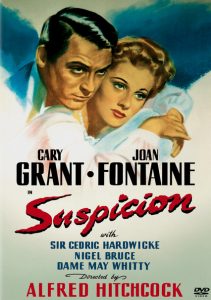Suspicion-1941
Director Alfred Hitchcock
Starring Cary Grant, Joan Fontaine
Scott’s Review #1,029
Reviewed June 3, 2020
Grade: B+
An early American effort by the master of suspense Alfred Hitchcock (1941) follows the Oscar-winning Rebecca (1940) with a similarly themed film.
A dazzling beauty (Joan Fontaine) is manipulated by her charming husband (Cary Grant), but is he gaslighting her and plotting her death, or is it all in her mind? The puzzle unfolds with a sizzling final thirty minutes that eclipses the remainder of the film, which drags and plods along slowly.
Wealthy but insecure Lina McLaidlaw (Fontaine) meets handsome and irresponsible playboy Johnnie Aysgarth (Grant) on a train in England. He charms her into eloping despite the strong disapproval of her father, General McLaidlaw (Sir Cedric Hardwicke), who thinks Johnnie is after the family’s money.
After a lavish honeymoon and return to an extravagant new home, Lina discovers that Johnnie has no job and no income, habitually lives on borrowed money, and intends to try to sponge off her father.
She talks him into getting a job, which he embezzles from.
Lina begins to think that not only is Johnnie after her money, but he intends to kill her. She becomes aware of his financial schemes and motivations, feeling conflicted over her love for him and her survival.
Events kick into high gear after a friend’s death, an insurance policy, and discussions with an author’s friend, Isobel Sedbusk (Auriol Lee), a writer of mystery novels about untraceable poisons. A bizarre dinner conversation surrounding ways to get away with murder causes Lina to start unraveling.
Many suspensions of disbelief must be contained in frustrating measures throughout most of the film, and a bothersome level of female mistreatment is to be endured.
From the very first scene, Lina’s insecurity gnaws at me. She is gorgeous, rich, and intelligent, so why does she feel, and is perceived even by her parents, as a lonely spinster sure to become an old maid?
Despite Hitchcock’s love of glasses on female characters, brandishing Lina with gawky bifocals hardly makes her an ugly duckling. Johnnie’s nickname, “Monkeyface,” is jarring and insulting.
The determination not to make Hollywood royalty Carey Grant too bad of a guy does not work. It feels like a weak effort to suddenly change the story to thwart the perception of a character as not a villain but someone to feel sympathetic toward.
Unclear is if this was Hitchcock’s decision or the mighty studio’s (my best guess would be the latter since Hitchcock was not afraid to take risks). The audience hardly has a chance to let their emotions marinate as the big reveal quickly culminates in the end credits rolling, and the film concludes.
A significant positive to Spellbound is the hidden tidbits brewing beneath the main saga of the Hollywood glamour boy and girl (Grant and Fontaine).
A clever LGBTQ+ revelation among two supporting characters can be unearthed decades before the terminology was invented. Hitchcock loved his gay characters, who could not be openly gay, though the director did his best to offer the now-obvious idiosyncrasies.
Sophisticated Isobel seems to live alone in her quaint and lovely cottage, but during a dinner party, a blonde woman wearing a suit and tie, clearly butch, joins the conversation. As Isobel asks her to pour more wine, we realize she is hardly a servant but Isobel’s lesbian lover!
The stunning yet highly subtle revelation is prominent to eagle-eyed viewers and cagey enough to catch on. In addition to these lovely ladies, an odd-looking male dinner guest wearing glasses and discussing murder novels is an interesting character, though we see little of him.
The same can be said for Lina’s sophisticated mother, Mrs. Martha McLaidlaw (Dame May Whitty), and Lina and Johnnie’s maid, Ethel (Heather Angel). Both, playing minor roles, add subtle delights to the film.
Suspicion (1941) is an early Hitchcock film that is rarely mentioned among his best works. The film is a tough sell because of its tedious pace, the lead character’s inexplicable insecurity, and the unfulfilling story conclusion.
The suspense and activity in the final act (mostly the stunning edge of the cliff car drive) promote the film to an above-average rating, but grander works were soon to follow in the decades ahead.
The most fun is noticing the delicious peculiarities of interesting supporting characters.
Oscar Nominations: 1 win-Outstanding Motion Picture, Best Actress-Joan Fontaine (won), Best Scoring of a Dramatic Picture
